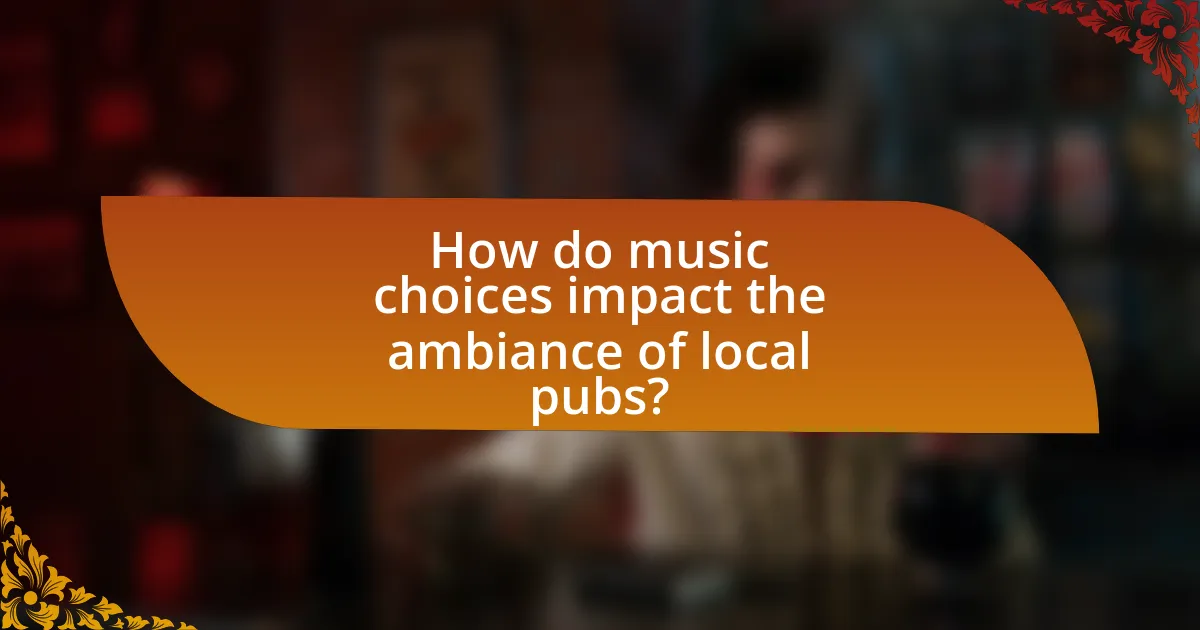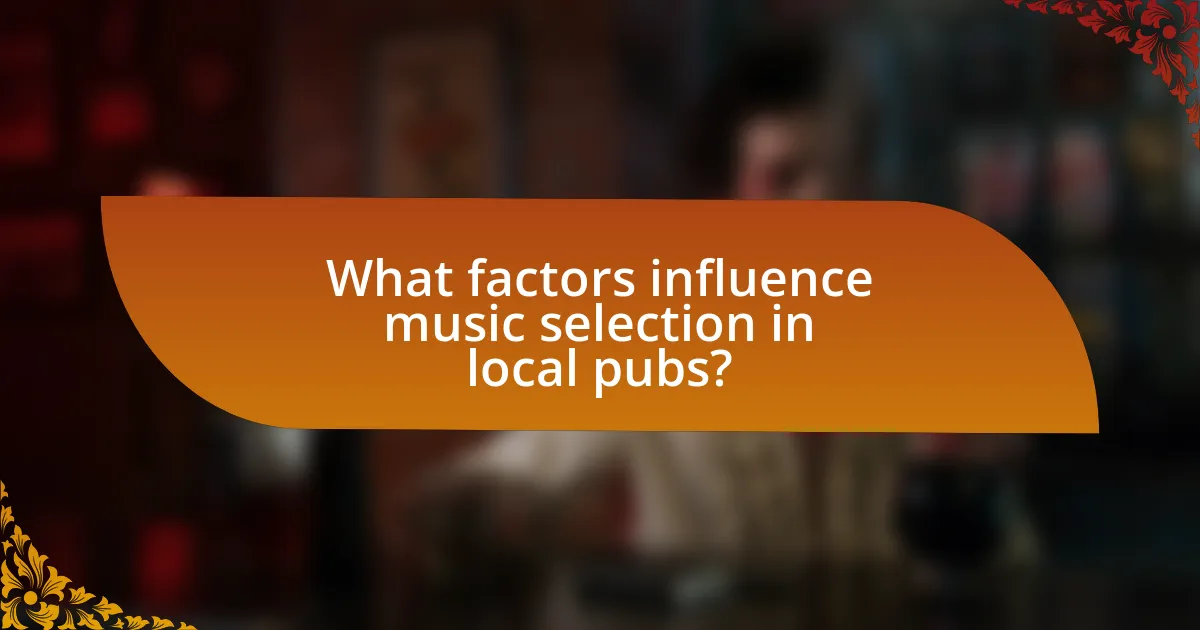The article examines how music choices significantly influence the ambiance of local pubs, affecting patrons’ moods and social interactions. It highlights the impact of different music genres and tempos on customer behavior, including their spending habits and overall satisfaction. Key factors influencing music selection include target demographics, time of day, and the pub’s branding. The article also discusses the financial implications of music choices, strategies for optimizing music selection, and best practices for creating an engaging atmosphere that enhances the pub experience.

How do music choices impact the ambiance of local pubs?
Music choices significantly impact the ambiance of local pubs by influencing patrons’ moods and social interactions. For instance, upbeat and lively music can create an energetic atmosphere, encouraging conversation and engagement among customers, while softer, more mellow tunes can foster a relaxed environment conducive to intimate gatherings. Research indicates that background music affects consumer behavior; a study published in the Journal of Consumer Research found that the tempo and volume of music can alter the pace at which customers consume drinks and food, thereby affecting overall sales. Thus, the selection of music directly shapes the experience and ambiance within local pubs, influencing both customer satisfaction and business outcomes.
What role does music play in shaping the atmosphere of a pub?
Music plays a crucial role in shaping the atmosphere of a pub by influencing patrons’ moods and social interactions. The selection of music can create a lively environment that encourages conversation and engagement, or a more subdued atmosphere that promotes relaxation. Research indicates that background music can significantly affect customers’ perceptions of the space; for instance, a study published in the Journal of Consumer Research found that upbeat music can increase the time spent in a venue and enhance overall enjoyment. Additionally, specific genres can evoke particular emotions, further tailoring the pub’s ambiance to match the desired experience, whether it be energetic, cozy, or sophisticated.
How does music influence customer mood and behavior in pubs?
Music significantly influences customer mood and behavior in pubs by creating an atmosphere that can enhance social interactions and overall enjoyment. Research indicates that specific genres and tempos can evoke different emotional responses; for instance, upbeat music tends to increase energy levels and encourage socializing, while slower music can promote relaxation and longer stays. A study published in the Journal of Consumer Research found that background music can affect the amount of time customers spend in a venue, with faster tempos leading to quicker consumption of drinks and slower tempos encouraging patrons to linger longer. This relationship between music and customer behavior highlights the importance of strategic music selection in shaping the pub experience.
What types of music are commonly played in local pubs?
Local pubs commonly play genres such as rock, folk, country, and pop music. These genres are popular because they create an inviting atmosphere that encourages social interaction among patrons. Research indicates that upbeat and familiar tunes enhance the overall experience, making customers more likely to stay longer and engage with others. For instance, a study published in the Journal of Consumer Research found that background music significantly influences the mood and behavior of customers in social settings, including pubs.
Why is the selection of music important for pub owners?
The selection of music is crucial for pub owners because it directly influences the atmosphere and customer experience. Music sets the mood, encourages social interaction, and can enhance the overall enjoyment of patrons. Research indicates that the right music can increase customer dwell time and spending; for instance, a study published in the Journal of Consumer Research found that background music can significantly affect the pace at which customers consume food and drinks, ultimately impacting sales. Therefore, thoughtful music selection is essential for creating an inviting environment that attracts and retains customers.
How can music choices affect customer retention and satisfaction?
Music choices significantly affect customer retention and satisfaction by shaping the overall atmosphere and emotional experience within local pubs. Research indicates that the right music can enhance customers’ moods, leading to longer stays and increased spending. For instance, a study published in the Journal of Consumer Research found that background music influences customers’ perceptions of service quality and their willingness to return, with upbeat tempos correlating with higher satisfaction levels. Additionally, specific genres can evoke nostalgia or create a sense of community, further encouraging patrons to revisit the establishment. Thus, strategic music selection is crucial for fostering a positive ambiance that promotes customer loyalty.
What are the financial implications of music selection in pubs?
The financial implications of music selection in pubs are significant, as the right music can enhance customer experience, leading to increased patronage and higher sales. Research indicates that background music influences consumer behavior; for instance, a study published in the Journal of Consumer Research found that slower tempos can encourage customers to linger longer, resulting in increased spending per visit. Additionally, music that aligns with the target demographic can enhance brand identity, attracting a loyal customer base and boosting overall revenue. Therefore, strategic music selection directly correlates with financial performance in the pub industry.
How do different genres of music create varied pub experiences?
Different genres of music create varied pub experiences by influencing the atmosphere, customer behavior, and overall enjoyment. For instance, upbeat genres like pop and dance music tend to energize patrons, encouraging social interaction and lively conversations, while genres such as jazz or acoustic create a more relaxed and intimate setting, promoting quieter discussions. Research indicates that background music can significantly affect consumer behavior; a study published in the Journal of Consumer Research found that fast-tempo music can lead to increased spending in bars and restaurants, while slow-tempo music encourages patrons to linger longer, enhancing their overall experience. Thus, the choice of music genre directly shapes the ambiance and social dynamics within a pub.
What ambiance do upbeat genres like pop and rock create?
Upbeat genres like pop and rock create a lively and energetic ambiance. This atmosphere encourages social interaction, enhances mood, and promotes a sense of enjoyment among patrons. Research indicates that music with a fast tempo and major key, typical of pop and rock, can elevate heart rates and stimulate positive emotions, making it ideal for settings like local pubs where engagement and fun are desired. Studies show that environments featuring upbeat music can lead to increased customer satisfaction and longer stays, reinforcing the importance of music choices in shaping the overall experience in social venues.
How do slower genres like jazz or acoustic influence relaxation and conversation?
Slower genres like jazz and acoustic music significantly enhance relaxation and conversation by creating a soothing auditory environment. Research indicates that these genres often feature softer dynamics and slower tempos, which can lower heart rates and reduce stress levels, promoting a calm atmosphere conducive to social interaction. A study published in the Journal of Consumer Research found that background music with a slower tempo encourages patrons to linger longer in social settings, thereby increasing the likelihood of conversation. Additionally, the improvisational elements of jazz can stimulate engagement and connection among listeners, further enhancing the conversational experience in local pubs.

What factors influence music selection in local pubs?
Music selection in local pubs is influenced by several key factors, including the target demographic, the time of day, and the overall theme or branding of the establishment. The target demographic dictates the genre and style of music played, as pubs often cater to specific age groups or cultural preferences. For instance, a pub frequented by younger patrons may opt for contemporary pop or electronic music, while a venue attracting an older crowd might choose classic rock or jazz.
The time of day also plays a significant role; during peak hours, pubs may select upbeat and energetic tracks to enhance the lively atmosphere, whereas during quieter times, softer background music may be preferred to encourage conversation. Additionally, the theme or branding of the pub influences music choices, as establishments with a rustic or traditional theme may lean towards folk or acoustic music to complement their decor and ambiance.
Research indicates that music can significantly affect customer behavior and mood, with studies showing that the right music can enhance the overall experience and increase patron retention. For example, a study published in the Journal of Consumer Research found that background music can influence the amount of time customers spend in a venue, thereby impacting sales.
How do target demographics affect music choices?
Target demographics significantly influence music choices by shaping the selection based on the preferences, age, cultural background, and social behaviors of the audience. For instance, a pub targeting a younger demographic may opt for contemporary pop or electronic music to resonate with patrons aged 18-30, while a venue appealing to an older crowd might feature classic rock or jazz, reflecting the musical tastes prevalent during their formative years. Research indicates that 70% of consumers feel that music enhances their experience in social settings, suggesting that aligning music with the target demographic can enhance customer satisfaction and retention.
What age groups prefer specific music genres in pubs?
Younger adults aged 18-24 typically prefer pop and electronic dance music in pubs, while those aged 25-34 often enjoy indie rock and hip-hop. Adults aged 35-44 tend to favor classic rock and alternative music, and individuals aged 45 and above generally prefer genres like jazz and classic hits. This trend is supported by a survey conducted by the Music Industry Research Association, which found that 70% of younger patrons gravitate towards contemporary genres, while older demographics show a preference for nostalgic music styles.
How does the cultural background of patrons influence music selection?
The cultural background of patrons significantly influences music selection by shaping their preferences and expectations for musical genres and styles. Patrons from diverse cultural backgrounds often bring distinct musical tastes that reflect their heritage, leading to a demand for specific genres such as reggae, jazz, or traditional folk music in local pubs. For instance, a study published in the Journal of Cultural Economics found that venues catering to specific ethnic communities tend to feature music that resonates with the cultural identity of their patrons, enhancing the overall experience and ambiance. This alignment between cultural background and music selection fosters a sense of belonging and enhances social interactions among patrons, ultimately influencing the atmosphere of the pub.
What role does the time of day play in music selection?
The time of day significantly influences music selection in local pubs, as different times evoke distinct moods and social dynamics. For instance, during the morning and early afternoon, lighter, more upbeat music is often played to create a relaxed atmosphere conducive to conversation and casual dining. In contrast, as the evening approaches, pubs typically shift to more energetic and upbeat genres to encourage social interaction and dancing, aligning with the increased patron activity. Research indicates that music tempo and genre can affect patrons’ drinking behavior and overall enjoyment, with faster tempos correlating with higher consumption rates. This strategic selection of music based on the time of day helps to enhance the ambiance and meet the expectations of customers, ultimately influencing their experience and duration of stay.
How does music change from day to night in local pubs?
Music in local pubs transitions from upbeat and lively during the day to more relaxed and ambient in the evening. During daytime hours, pubs often play energetic genres like pop, rock, or folk to create a vibrant atmosphere that encourages socializing and dining. As night approaches, the music shifts to softer styles such as jazz, acoustic, or electronic chill, fostering a more intimate setting suitable for conversation and relaxation. This change aligns with the natural progression of pub activities, where daytime patrons may be families or casual diners, while nighttime visitors often seek a more laid-back experience. Studies indicate that music tempo and volume significantly influence customer behavior and mood, reinforcing the importance of these changes in enhancing the overall ambiance of local pubs.
What are the effects of live music versus recorded music in pubs?
Live music in pubs creates a more engaging and interactive atmosphere compared to recorded music. Research indicates that live performances can enhance social interaction and increase customer satisfaction, as patrons often feel a stronger connection to the performers and the overall experience. A study published in the Journal of Hospitality and Tourism Research found that venues featuring live music reported higher levels of customer retention and increased spending, with patrons willing to pay more for the unique experience. In contrast, recorded music tends to provide a consistent background ambiance but lacks the dynamic energy and personal touch that live performances offer, resulting in a less memorable experience for customers.

How can pub owners optimize music choices for better ambiance?
Pub owners can optimize music choices for better ambiance by selecting tracks that align with the desired atmosphere and customer demographics. Research indicates that music tempo and genre significantly influence patrons’ mood and behavior; for instance, slower tempos can create a relaxed environment, while upbeat music can energize the space. Additionally, utilizing playlists that reflect the time of day and specific events can enhance the overall experience. A study published in the Journal of Consumer Research found that background music can affect spending behavior, with the right music leading to increased customer dwell time and higher sales. Therefore, by carefully curating music selections based on these factors, pub owners can effectively enhance the ambiance and improve customer satisfaction.
What strategies can be employed to select the right music for a pub?
To select the right music for a pub, one effective strategy is to understand the target demographic and their preferences. Research indicates that music can significantly influence customer behavior and mood; for instance, a study published in the Journal of Consumer Research found that background music can affect the amount of time customers spend in a venue and their spending habits.
Another strategy involves curating playlists that align with the time of day and the type of crowd expected. For example, upbeat and energetic music may be suitable during peak hours to enhance a lively atmosphere, while softer, more relaxed tunes can create a comfortable environment during quieter times.
Additionally, incorporating local or genre-specific music can foster a sense of community and connection among patrons. A survey by the Music Industry Research Association revealed that 70% of respondents prefer venues that feature local artists, which can enhance the pub’s unique identity and attract a loyal customer base.
Finally, regularly updating the music selection based on seasonal trends and customer feedback ensures that the ambiance remains fresh and engaging, ultimately contributing to a positive pub experience.
How can pub owners gather feedback on music preferences from patrons?
Pub owners can gather feedback on music preferences from patrons by implementing surveys and feedback forms. These tools can be distributed physically in the pub or digitally through email or social media platforms. Research indicates that 70% of customers are willing to provide feedback when prompted, which highlights the effectiveness of direct engagement methods. Additionally, hosting music-themed events or open mic nights can encourage patrons to express their preferences in a social setting, further enhancing the feedback collection process.
What tools and technologies can assist in music selection for pubs?
Music selection for pubs can be assisted by various tools and technologies, including streaming services, digital jukeboxes, and music management software. Streaming services like Spotify and Apple Music offer curated playlists tailored for different atmospheres, allowing pub owners to easily select music that matches their desired ambiance. Digital jukeboxes, such as TouchTunes, provide patrons with the ability to choose songs, enhancing customer engagement while allowing for a diverse music selection. Music management software, like Soundtrack Your Brand, enables pub owners to create custom playlists and schedule music to fit specific times or events, ensuring a consistent atmosphere that aligns with the pub’s branding. These technologies not only streamline the music selection process but also contribute to creating an inviting environment that can influence customer experience and retention.
What best practices should pub owners follow for music curation?
Pub owners should prioritize creating a diverse and engaging music playlist that aligns with their target audience and enhances the overall ambiance. This involves regularly updating the music selection to reflect current trends and seasonal themes, ensuring a mix of genres to cater to different customer preferences, and considering the volume and tempo of the music to match the time of day and crowd dynamics. Research indicates that appropriate music can increase customer dwell time and spending, with a study by the Journal of Retailing showing that background music influences consumer behavior significantly.
How can a balanced music playlist enhance the overall pub experience?
A balanced music playlist enhances the overall pub experience by creating an inviting atmosphere that encourages social interaction and enjoyment. Research indicates that music influences mood and behavior; for instance, a study published in the Journal of Consumer Research found that background music can significantly affect patrons’ spending behavior and time spent in a venue. By carefully selecting a mix of genres and tempos, pubs can cater to diverse customer preferences, fostering a sense of community and enhancing the overall enjoyment of the space. This strategic approach to music selection not only elevates the ambiance but also contributes to customer satisfaction and retention.
What are common pitfalls to avoid when choosing music for a pub?
Common pitfalls to avoid when choosing music for a pub include selecting genres that do not match the target audience’s preferences, playing music at inappropriate volume levels, and failing to consider the time of day or specific events. Choosing music that alienates patrons can lead to decreased customer satisfaction; for instance, a study by the Journal of Consumer Research indicates that music congruent with the environment enhances the overall experience. Additionally, excessively loud music can hinder conversation, negatively impacting social interactions, which are crucial in a pub setting. Lastly, neglecting to adapt the playlist for different times, such as upbeat tracks during peak hours and softer tunes during quieter times, can result in a mismatch between the atmosphere and customer expectations.


